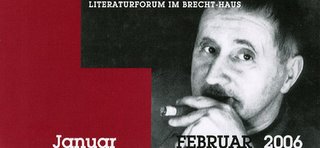THEATRE - Brecht, Bertolt


Brecht, Bertolt was born on February 10th 1898, Augsburg, Germany
German poet, playwright, and theatrical reformer, whose epic theatre departed from the conventions of theatrical illusion and developed the drama as a social and ideological forum for leftist causes.
On the 20’s Brecht developed a violently antibourgeois attitude that reflected his generation's deep disappointment in the civilization that had come crashing down at the end of World War I.
In Berlin (1924-33) he worked briefly for the directors Max Reinhardt and Erwin Piscator, but mainly with his own group of associates. With the composer Kurt Weill he wrote the satirical, successful ballad opera Die Dreigroschenoper (1928; The Threepenny Opera) and the opera Aufstieg und Fall der Stadt Mahagonny (1930; Rise and Fall of the Town of Mahoganny). He also wrote what he called "Lehr-stucke" ("exemplary plays"), badly didactic works for performance outside the orthodox theatre, to music by Weill, Hindemith, and Hanns Eisler. In these years he developed his theory of "epic theatre" and an austere form of irregular verse.
In 1933 he went into exile in Scandinavia (1933-41), mainly in Denmark, and then in the United States (1941-47). Between 1937 and 1941 he wrote most of his great plays, his major theoretical essays and dialogues, and many of the poems collected as Svendborger Gedichte (1939).
The plays of these years became famous in the author's own and other productions: notable among them are Mutter Courage und ihre Kinder (1941; Mother Courage and Her Children)
Brecht left the United States in 1947 after having had to give evidence before the House Un-American Activities Committee.
He spent a year in Zurich, working mainly on Antigone-Modell 1948 (adapted from Hulderlin's translation of Sophocles; produced 1948) and on his most important theoretical work, the Kleines Organon fur das Theater (1949; "A Little Organum for the Theatre").
The essence of his theory of drama, as revealed in this work, is the idea that a truly Marxist drama must avoid the Aristotelian premise that the audience should be made to believe that what they are witnessing is happening here and now.
In 1949 Brecht went to Berlin to help stage Mutter Courage und ihre Kinder (with his wife, Helene Weigel, in the title part) at Reinhardt's old Deutsches Theatre in the Soviet sector. This led to formation of the Brechts' own company, the Berliner Ensemble, and to permanent return to Berlin. Henceforward the Ensemble and the staging of his own plays had first claim on Brecht's time.
Often suspect in Eastern Europe because of his unorthodox aesthetic theories and denigrated or boycotted in the West for his Communist opinions, he yet had a great triumph at the Paris Theatre des Nations in 1955, and in the same year in Moscow he received a Stalin Peace Prize.
He died of a heart attack in East Berlin the following year.


0 Comments:
Post a Comment
<< Home